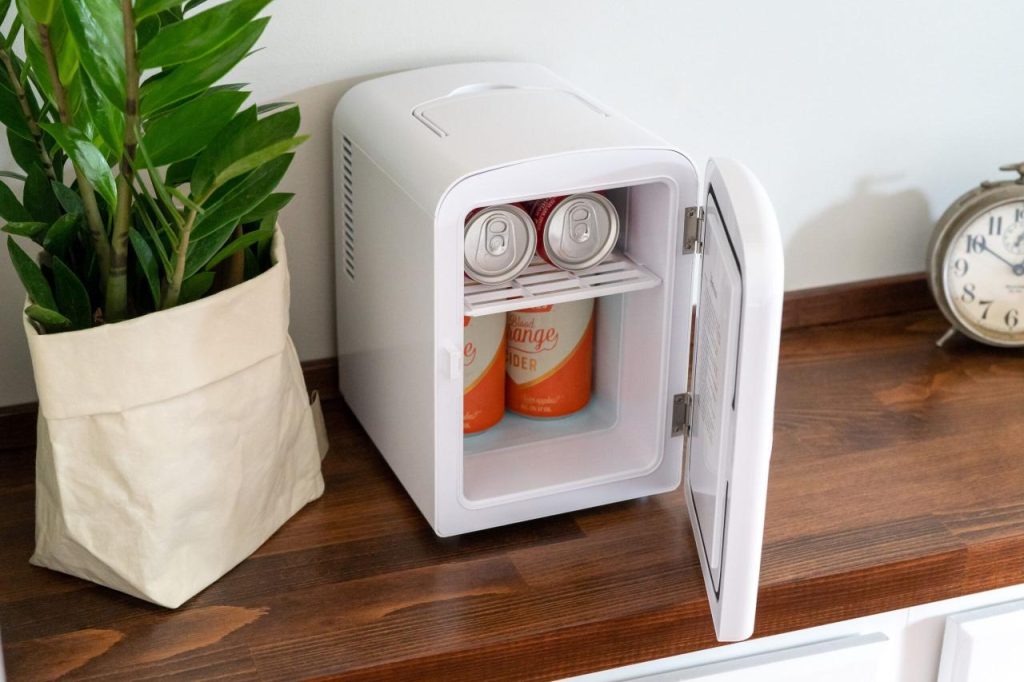Mini fridges, also known as compact refrigerators, are a popular choice for dorm rooms, offices, and small apartments due to their space-saving design. However, one common concern among potential buyers is the noise level of these appliances.
So, Do mini fridges make noise? This article of Cook eat Delicious will explore the factors that contribute to the noise produced by mini fridges and provide tips on how to mitigate this issue.
Do mini fridges make noise?
Exploring the Acoustic Landscape of Mini Fridges
Mini fridges, akin to their larger counterparts, employ a compressor to facilitate their refrigeration process. This fundamental component, responsible for circulating refrigerant through the cooling system, inevitably introduces some level of noise into the equation.

The extent of this auditory presence is contingent upon various factors, such as the construction quality of the fridge, its age, and the overall condition of its components. The nuances of these factors collectively contribute to the varying degrees of noise generated by mini fridges.
Understanding the noise dynamics becomes particularly pertinent when contemplating the placement of a mini fridge in a tranquil setting, be it a bedroom, office, or dorm room. The normal operation of mini fridges, akin to standard refrigerators, involves a certain degree of noise emission. To demystify and gauge this auditory landscape, here’s a comprehensive breakdown of the noise levels associated with mini fridges:
| Compressor Noise | The compressor is a crucial component in refrigeration systems. It circulates refrigerant and is responsible for cooling. When the compressor kicks in, it can produce a humming sound. The noise level varies among different models and brands. |
| Vibrations | Mini fridges may generate vibrations as the compressor and other components operate. Placing the fridge on a stable surface or using vibration-absorbing pads can help minimize this noise. |
| Defrosting | Some mini fridges have an automatic defrosting feature. During this process, the fridge may produce additional noise as it melts ice buildup. This is a temporary sound and usually not constant |
| Location Matters | sWhere you place the mini fridge can impact perceived noise. Placing it in an enclosed space or against a wall may amplify the sound. If possible, keep some distance between the fridge and walls or other surfaces. |
| Thermostat Clicking | When the thermostat turns the compressor on or off, it can produce a clicking sound. This is normal operation and is typically not excessively loud. |
| User Reviews | eading user reviews can provide valuable insights into the actual noise levels experienced by people who have purchased and used a specific mini fridge model. Real-world experiences can be helpful in gauging the noise performance |
| Regular Maintenance | Keeping the mini fridge clean and well-maintained can contribute to smoother and quieter operation. Regularly defrosting manual-defrost models and cleaning condenser coils can make a difference |
| Decibel Ratings | Manufacturers may provide decibel (dB) ratings for their appliances. Lower dB values indicate quieter operation. If noise is a significant concern, consider models with lower decibel ratings |
Ultimately, the noise level that is acceptable to you depends on your sensitivity to sound and the specific environment where you plan to use the mini fridge.
Consider the factors mentioned above, and if possible, listen to the appliance in a showroom or read reviews from users in similar situations to make an informed decision.
Factors Influencing
The initial determinant influencing the noise output of a mini fridge lies in its design and the quality of its construction. Elevated-tier models often incorporate superior insulation and more advanced compressors, effectively mitigating operational noise.
In contrast, budget-friendly models may compromise in these aspects, resulting in a more audible operation. The age and overall condition of the fridge further contribute to its noise profile. Over time, aging components may wear down, leading to reduced efficiency and an uptick in operational noise.
Implementing routine maintenance practices, such as cleaning coils and inspecting seals, becomes imperative in maintaining a smooth and quiet performance from a mini fridge. These measures ensure the longevity and optimal functioning of the appliance, countering the natural tendency of aging components to generate increased operational noise.

Mitigating the Noise from Mini Fridges
While completely eliminating noise from a mini fridge may be an impossibility, there are strategic measures you can implement to minimize its impact. These proactive steps encompass selecting a high-quality fridge, ensuring proper maintenance, and thoughtfully considering its placement within your space.
During your mini fridge selection process, prioritize models explicitly designed for reduced noise levels. Opt for those equipped with advanced compressors and enhanced insulation, features that contribute significantly to lowering operational noise. Additionally, seek out fridges with energy-efficient ratings, as these often correlate with quieter operatiStrategic Placement and Maintenance Practices**
Opt for a solid, level surface to mitigate vibration noise. Providing ample space around the fridge promotes improved air circulation, enhancing overall efficiency and potentially diminishing noise levels.
Regular maintenance routines are paramount in ensuring a hushed performance from your mini fridge. This includes routine tasks such as cleaning coils, inspecting door seals, and timely defrosting if required. By adhering to these practices, you actively contribute to the appliance’s longevity and optimal functionality, minimizing the likelihood of disruptive noise.
In summary, while mini fridges inherently produce some noise, the extent of this sound can be influenced by various factors. By comprehending these variables and taking deliberate steps to address them, you can seamlessly integrate the convenience of a mini fridge into your living spaces without significant acoustic disruptions. The key lies in informed choices during purchase, strategic placement, and dedicated maintenance efforts, ensuring a harmonious coexistence with your mini fridge.







